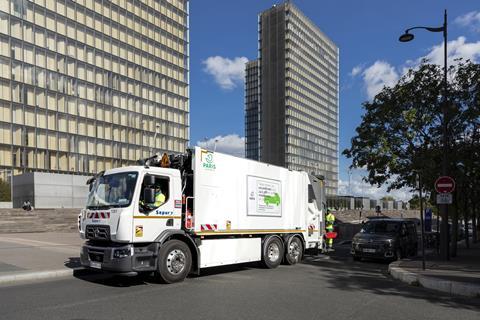Battery electric refuse collection vehicles are playing an increasingly important role for local authorities and waste companies needing to navigate challenging net zero targets.
The waste sector is one which seems ideally suited to decarbonisation – operations are often within stop-start, short-distance urban environments, and are part of an increasing pattern of reusing or recycling resources which have performed their primary function. So to be able to undertake waste collection using vehicles which minimise the impact and intrusion of the operation on the wider public and reduce CO2 emissions at the same time presents a compelling argument - and opportunity - for operators.

It is no surprise, therefore, that many public and private sector service providers are choosing to electrify the flagships of their fleets, their refuse collection vehicles, introducing eRCVs in multiple locations across the UK and Europe to improve service and reduce CO2 emissions.
In Barcelona the city authorities have stipulated that zero emission vehicles will be brought in for the city’s maintenance services, placing an order for 73 Renault Trucks electric vehicles covering cleaning and waste collection. Paris’s 13th district has also opted for 100% carbon-free waste collection using 18 electric Renault Trucks vehicles. As eRCVs lead the charge, more and more UK local authorities and waste companies are also switching to electric.
SUEZ recycling and recovery UK introduced the UK’s first 26 tonne electric Renault truck to collect commercial waste from Bristol city centre locations for processing at the company’s recycling and reprocessing site, reducing the city’s carbon footprint in multiple ways.
Enfield Council trialled two of Renault Trucks’ eRCV demonstrators before placing an order for four fully electric Renault Trucks E-Tech D26T low entry cab refuse trucks. The ultra-quiet and 100% electric vehicles, all equipped with CP Davidson Titan refuse bodies, are ready to service multiple clients, collecting domestic waste, green waste, recycling and commercial waste across the Borough.
For those unsure of the suitability of electric vehicles for their operations, one specialist vehicle hire company, CTS Hire, has an innovative solution. CTS has brought two eRCVs into its hire fleet, allowing councils and other vehicle operators to take zero-carbon models on short term hire for the first time. Supplied by RH Commercial Vehicles, the two Renault Trucks E-Tech D Wide electric rear-steer chassis have been paired with Dennis Eagle OL21 bodies and Terberg Xtra bin lifts. Both vehicles have gone straight into operation to prove the case for the electrification of fleets for more operators.
While refuse vehicles have been at the vanguard of the switch to electric, many more vehicle types lend themselves to electrification. The skip loader is commonplace in all our cities and their journeys are typically short-distance, return to base movements. Waste recycling specialist Recycling Lives has introduced the UK’s first 100% electric skip transporter trucks, two 18 tonne Renault Trucks E-Tech D 4x2s at its 15-acre Recycling Park in Preston. These vehicles are used in a similar way to their diesel counterparts, delivering their familiar service day in day out, but in a new, low-noise and zero-carbon way which has been welcomed by drivers and customers alike.
Closing the loop of waste services represents an obvious opportunity for operators, and it is no surprise that many are embracing the cleaner and greener solutions which electric vehicles offer. As with the electric refuse vehicle and skip loader we can look forward to more and more zero-carbon solutions in the sector in the near future. For waste, the big clean-up has already begun.










